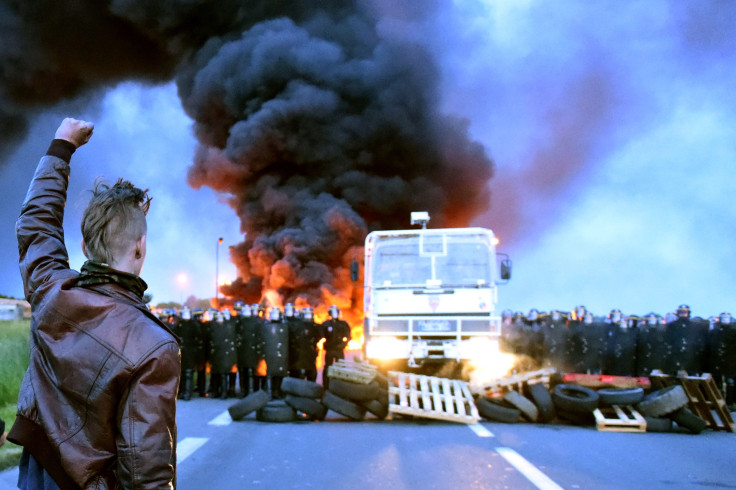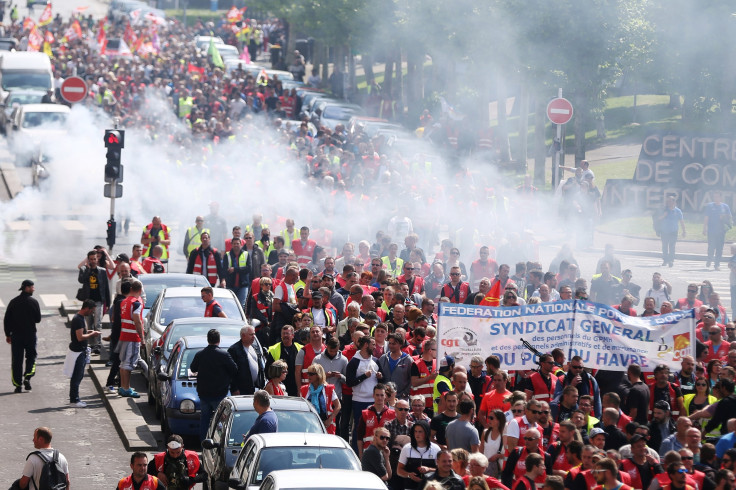French Nuclear Plant Workers Strike Against Labor Reforms

UPDATE: 7:30 a.m. EDT — Even as French authorities made some headway Thursday in resolving the fuel crisis in the country, caused by labor reforms protesters who blocked fuel depots across the nation, protests intensified in some places, most notably in the port city of Le Havre, which has a major oil terminal.
Fuel supplies in the country remained erratic, with some regions showing improvement over the last few days of acute shortages, the Associated Press reported. Alain Vidalies, junior minister for transport, said on Europe-1 radio that supplies to gas pumps had improved. “We unblocked 11 [fuel] depots and will continue to unblock them.”
Meanwhile, shortly after noon local time (about 6 a.m. EDT), thousands of dock workers in Le Havre arrived in a square outside the city hall and set off smoke bombs. Some of the bombs landed in fountains, throwing up plumes of water. The workers are blocking one of the country’s main oil terminals.

UPDATE: 3:40 a.m. EDT — As protests against labor reforms in France spread Thursday, with nuclear power plant workers joining in, the government appeared to be a in somewhat conciliatory mood. Prime Minister Manuel Valls said the government could consider changes in the contentious labor bill but would not withdraw it.
The bill could see “improvements and modifications” but its “heart” would not change, and withdrawing it “is not possible,” Valls said on BFM television, the Associated Press reported.
CGT union members rejected the gesture, asking instead for the bill to be scrapped completely.
Original story:
Staff at 19 nuclear power plants in France are striking Thursday in solidarity with ongoing protests against the government’s efforts to reform labor laws, the CGT union said Wednesday. The day-long protest will reduce power output in Europe’s third-largest economy but will not cause any blackouts.
According to grid operator RTE, at least 4GW of France's nuclear power capacity was affected on Thursday morning due to the actions of striking CGT workers, Reuters reported.
“One cannot just turn off a nuclear plant, it is not like a thermal or hydro plant,” Marie-Claire Cailletaud, spokeswoman for CGT energy and mining federation, said.
There are legal limits on strike action in the nuclear industry in France and the country can also import power from its neighbors to avoid blackouts. However, it increases costs for state-run utility Electricite de France, which operates the nuclear plants that generate 75 percent of the country’s electricity supply.
France is already reeling under the effects of the ongoing strike, led by CGT, which has led to disruptions at six of the country’s eight oil refineries, causing fuel shortages in large parts of France two weeks before it hosts Europe’s biggest soccer tournament. The government has been forced to start using its strategic oil reserves, which analysts say are enough to last four months.
The CGT union, one of most powerful in the country, is protesting the government pushing labor reforms through parliament using a constitutional device that allows it to bypass a vote. The reforms — the government says they will help reduce unemployment in the country, stuck at over 10 percent — will make hiring and firing easier for companies. They will also give firms greater freedom to reduce wages and leaves, as well as allow some flexibility on the 35-hour work week, which is currently the norm.
Though largely backed by most other unions, CGT says the reforms will dilute protective labor laws.
The government has accused CGT of “trying to radicalize things.” Junior minister Jean-Marie Le Guen told RTL radio the government “will unblock the situation” and added that a union “cannot govern the country.”
Police have already been clearing blockades and dislodging protesters from various sites, including fuel depots, around the country. Prime Minister Manuel Valls told the parliament: “No option will be ruled out. The forces of law and order have been intervening since Friday, and will continue to do so.”
The union, however, seems to be in no mood to back down.
“It is no longer enough for us go out on the streets, they don’t listen to us anymore. Now we will start with heavier arms, a little more substantial, and we all fight and tell the government that this is enough,” CGT official Jean-Claude Colin said.
Apart from fuel shortages for vehicle owners, other travel services in the country have also been affected and the disruptions are expected to intensify Thursday.
© Copyright IBTimes 2024. All rights reserved.





















